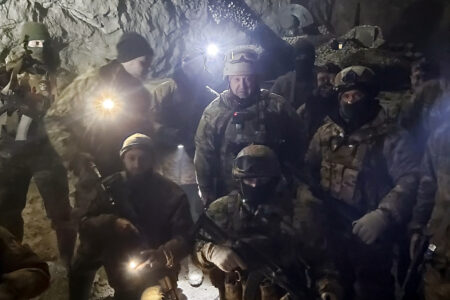According to unsubstantiated claims by Western big outlets, the head of the Wagner Group would be selling out Russian positions to Ukraine’s intelligence.
Written by Lucas Leiroz, journalist, researcher at the Center for Geostrategic Studies, geopolitical consultant.
Western media keeps spreading lies and trying to show some kind of disunity and instability among Russian forces. Big outlets are claiming that the head of the Russian private military company (PMC) Wagner Group had met with Ukrainian intelligence agents in Africa to negotiate the leak of information about positions of the Russian armed forces. As expected, no proof of such a meeting was presented, being just another unsubstantiated and illogical report by Western journalists.
In an article recently published by the Washington Post, it was reported that Russian businessman Evgeny Prigozhin would have contacted two Ukrainian officials linked to the intelligence agency “GUR” somewhere on the African continent in order to sell out the location of Russian units on the battlefield. As a source for its serious allegations, the newspaper claims to have some classified US intelligence documents showing such information. The files would have leaked to social networks, thus reaching the Post’s journalists.
The news went viral in the media, being shared and translated by several other websites around the world. Pro-Western analysts used the report as an argument to support the narrative that there is “disunity” among Russians, with Wagner’s private troops conspiring against Defense Ministry’s soldiers. With this type of “information”, such propagandists try to assert that there is an internal conflict, making it impossible for Moscow to organize tactics and plan combat actions effectively. In practice, this helps to strengthen narratives about the possibility of a Ukrainian victory, boosting Western public support for sending more weapons and money to the neo-Nazi regime.
However, it seems that the news reported by the Post is untrue. Wagner’s commander responded to the “speculation dumped by the Washington Post” and stated that it would be “physically impossible” for him to travel to Africa, which would be enough to eliminate any suspicion in this regard. He emphasized that the last time he went to Africa was a few months before the start of the special military operation, which is why he believes that the newspaper is speculating or deliberately spreading disinformation.
In fact, it is not difficult to prove the veracity of Prigozhin’s words. He has been on the frontlines most of the time since the beginning of the operation, attending his troops on the field and daily sharing photos and videos of the real situation of the conflict. Contrary to what is common among PMCs’ leaders around the world, Prigozhin does not command his troops remotely, but remains with his soldiers on the frontlines, which is why he has become broadly respected among Russians. So, it is really hard to believe that he has recently traveled to another continent.
In addition, there are other important issues to be analyzed. For example, logistically, it would also be virtually impossible for Prigozhin to operate such a long trip at this time of security crisis. The businessman has already been the target of attacks and assassination attempts, and it is safer for him to remain in the conflict zone than to undertake long trips – even more so to supposedly meet enemy agents, which would certainly be seen as a “trap” to eliminate him.
Also, there is the most important fact, which is the clear Western attempt to take advantage of Prigozhin’s behavior. Wagner’s boss constantly makes “controversial” statements on his social networks, sometimes criticizing Russian officials and making it appear that there are conflicts of interests between his PMC and the Ministry of Defense. However, according to basic principles of military strategy, this sounds like a distraction tactic. The objective seems to be precisely to confuse the enemy, making it appear that Russian forces are disintegrated and chaotic, when in fact they act together to achieve relevant objectives.
The media ignores the military factor in Prigozhin’s behavior and tries to endorse the Russian “disunity” narrative, but fails with its unbelievable accusations. Even among Ukrainians and Westerners, criticism against Prigozhin is usually focused on pointing out his pro-Russian “fanaticism”, with no questioning of his loyalty. So, it will be definitely difficult, if not impossible, to prevail the narrative that he is betraying the Russian army.
The practice of spreading fake news and distortions is an inseparable part of the West-Ukrainian strategy in information warfare. Serious and unproven accusations targeting Russian officials have already become commonplace. However, in some cases, the exaggerations are so evident that the tendency is for the narratives to fail – and this is precisely the current case with Prigozhin.


